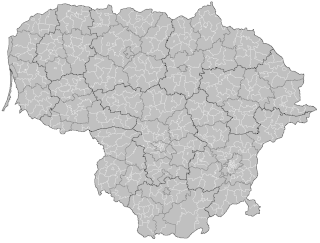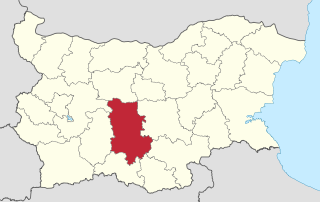
This article is about the demographic features of the population of Lithuania, including population density, ethnicity, level of education, health, economic status, and religious affiliations.

The demography of the Republic of Bulgaria is monitored by the National Statistical Institute of Bulgaria.

The Poles, or Polish people, are a nation and an ethnic group of predominantly West Slavic descent, who share a common history, culture, the Polish language and are identified with the country of Poland in Central Europe. The preamble to the Constitution of the Republic of Poland defines the Polish nation as comprising all the citizens of Poland, regardless of heritage or ethnicity.

Lithuanians are a Baltic ethnic group. They are native to Lithuania, where they number around 2,561,300 people. Another million or more make up the Lithuanian diaspora, largely found in countries such as the United States, United Kingdom, Brazil, Russia, and Canada. Their native language is Lithuanian, one of only two surviving members of the Baltic language family along with Latvian. According to the census conducted in 2001, 83.45% of the population of Lithuania identified themselves as Lithuanians, 6.74% as Poles, 6.31% as Russians, 1.23% as Belarusians, and 2.27% as members of other ethnic groups. Most Lithuanians belong to the Catholic Church, while the Lietuvininkai who lived in the northern part of East Prussia prior to World War II, were mostly Evangelical Lutherans.

Plovdiv Province is a province in central southern Bulgaria. It comprises 18 municipalities on a territory of 5,972.9 km2 (2,306.1 sq mi) with a population, as of February 2011, of 683,027 inhabitants. The province is named after its administrative and industrial centre — the city of Plovdiv.

Lovech Province is one of the 28 provinces of Bulgaria, lying at the northern centre of the country. It is named after its main city - Lovech. As of December 2009, the population of the area is 151,153.

The Bulgarian Muslims or Muslim Bulgarians are Bulgarians of the Islamic faith. They are generally thought to be the descendants of the local Slavs who converted to Islam during Ottoman rule. Most scholars have agreed that the Bulgarian Muslims are a "religious group of Bulgarian Slavs who speak Bulgarian as their mother tongue and do not understand Turkish, but whose religion and customs are Islamic". Bulgarian Muslims live mostly in the Rhodopes – Smolyan Province, the southern part of the Pazardzhik and Kardzhali Provinces and the eastern part of the Blagoevgrad Province in Southern Bulgaria. They also live in a group of villages in the Lovech Province in Northern Bulgaria. The name Pomak is pejorative in Bulgarian and is resented by most members of the community, The name adopted and used instead of Pomak is Bulgarian Muslims.

Islam in Bulgaria is a minority religion and the second largest religion in the country after Christianity. According to the 2011 Census, the total number of Muslims in Bulgaria stood at 577,139, corresponding to 7.8% of the population. According to a 2017 estimate, Muslims make up 15% of the population. Ethnically, Muslims in Bulgaria are Turks, Bulgarians and Roma, living mainly in parts of northeastern Bulgaria and in the Rhodope Mountains.
Chicago's demographics show that it is a large and ethnically diverse metropolis. It is the third largest city and metropolitan area in the United States by population, and the city was home to over 2.7 million people in 2020, accounting for over 25% of the population in the Chicago metropolitan area; home to approximately 9.6 million. The racial makeup of the city in 2010 was 45.3% white, 32% black, 5% Asian, and 3% from two or more races. The ethnic makeup of the population is 28% Hispanic and 72% belong to non Hispanic background. English is the primary language of the city, and Christianity accounts as the predominant faith.

Bulgarian Turks, are a Turkish ethnic group from Bulgaria. In 2011, there were 588,318 Bulgarians of Turkish descent, roughly 8.8% of the population, making them the country's largest ethnic minority. They primarily live in the southern province of Kardzhali and the northeastern provinces of Shumen, Silistra, Razgrad and Targovishte. There is also a diaspora outside Bulgaria in countries such as Turkey, Austria, the Netherlands, Sweden, Norway and Romania, the most significant of which are the Bulgarian Turks in Turkey.

Vlachs, are a community concentrated in the Vidin Province in the northwestern part of Bulgaria. Most of this people declare themselves vlasi (Vlachs) when asked in Bulgarian. The Vlachs in Bulgaria are not recognized as a national minority, and as an ethnic group and they don't have ethnic rights in schools or churches since the Interwar period.

Macedonian Americans are Americans of ethnic Macedonian heritage.
The population of post-World War II Poland became nearly completely ethnically homogeneous as a result of the German-Nazi Holocaust, the radically altered borders, and the deportations ordered by the Soviet authorities, who wished to remove the sizeable Polish minorities from the Baltics (Lithuania) and Eastern Europe.

The Macedonian diaspora consists of ethnic Macedonian emigrants and their descendants in countries such as Australia, Italy, the United Kingdom, Germany, New Zealand, Canada, the United States and others. A 1964 estimate put the number of Macedonian emigrants at over 580,000.
The Albanian diaspora are the ethnic Albanians and their descendants living outside of Albania, Kosovo, southeastern Montenegro, western North Macedonia, southeastern Serbia, northwestern Greece and Southern Italy.
Armenians in Lithuania refers to ethnic Armenians living in Lithuania.

Bulgarian Canadians are Canadian citizens or residents from Bulgaria or people of Bulgarian descent. According to the 2016 Census there were 34,560 Canadians who claimed Bulgarian ancestry, an increase compared to the 27,260 of the 2006 Census.
The government of Lithuania has made provision for ethnic minorities since 1918. A substantial Jewish group that existed up to World War II was almost eliminated in the Holocaust. The Census of 2011 showed that 15.8% of inhabitants belonged to ethnic minorities: the two largest groups were the Poles and the Russians, although the proportions had decreased since independence in 1989. Other minorities include the Samogitians - not classified in the Census - and the historically important Latvian-speaking Kursenieki.
Armenians in the Baltic states of Estonia, Latvia, and Lithuania settled there mostly during the Soviet occupation of the Baltic States.

Based on the numbers of adherents, the Eastern Orthodox Church is the second largest Christian communion in the world, after the Roman Catholic Church, with the most common estimates of baptised members being approximately 220 million. The numerous Protestant groups in the world, if taken all together, substantially outnumber the Eastern Orthodox, but they differ theologically and do not form a single communion.













